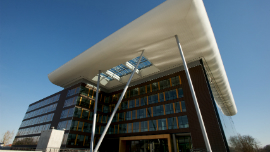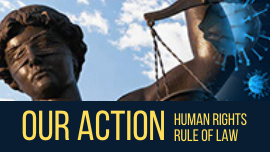Security, Integrity and Rule of Law Directorate

"The Directorate of Security, Integrity and Rule of Law monitors and supports the implementation of the Council of Europe’s standards on criminal law, corruption, terrorism, cybercrime, data protection, AI, internet governance, money laundering and many other highly topical issues related to crime, human rights protection, new technologies and information.
The aim is that the rights protected in the Council of Europe’s standards are effectively implemented, and that new standards are developed as the needs and complexities of our societies evolve. In particular to meet the challenges of digital technologies and environmental protection, priorities laid down in the Reykjavik Declaration of the 4th Council of Europe Summit.
For this, the Directorate puts into practice the Organisation's unique strategic triangle of setting new standards, carrying out monitoring, and offering technical co-operation and advice to interested beneficiary states."
Information society

Artificial intelligence

Artificial intelligence (AI) will have an impact on our societies that we hardly imagine. Algorithms are already said to be able to identify the best candidates for a job, assist doctors to establish medical diagnoses or help lawyers before the courts. All this is not entirely new, since already in the 1980s, expert systems assisted humans with a high level of expertise. What is new today is that computers are increasingly able to perform extremely complex tasks independently, but their designers sometimes no longer understand how, what has happened in the "black box" of deep learning.

Protection of personal data

The Convention opened for signature on 28 January 1981 was the first legally binding international instrument in the data protection field. Parties to the convention are required to take the necessary steps in their domestic legislation to apply the principles it lays down in order to ensure respect in their territory for the fundamental human rights of all individuals with regard to processing of personal data.

Action against cybercrime

The Council of Europe Convention on Cybercrime, known as the Budapest Convention, is the only binding international instrument in the field. The treaty provides guidelines for any country developing comprehensive national legislation against Cybercrime and as a framework for international co-operation between States Parties to this treaty.
Audiovisual industries
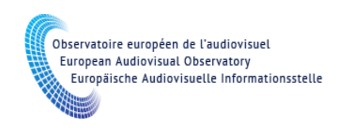
European Audiovisual Observatory

The Observatory was created in 1992 in order to collect and distribute information about the audiovisual industries in Europe. By making this information available, the Observatory aims at promoting greater transparency and a clearer understanding of the ways in which the audiovisual industries in Europe function, both from an economic and legal point of view.
Action against crime
Legal co-operation: criminal law
The European Committee on Crime Problems (CDPC) identifies priorities for intergovernmental legal co-operation, makes proposals to the Committee of Ministers on activities in the fields of criminal law and procedure, criminology and penology, and implements these activities.

Prisons and community sanctions and measures

The Council of Europe's expertise in promoting more humane and socially effective prisons is unique. It has adopted a number of legal instruments, including the European Prison Rules and recommendations on education in prison, prison staff, healthcare in prison and prison overcrowding.

Transnational criminal justice

Treaties have been negotiated within the Council of Europe establishing a common basis for co-operation in criminal matters across Europe and sometimes beyond. They cover co-operation mechanisms such as extradition, mutual legal assistance and the transfer of persons serving prison sentences.
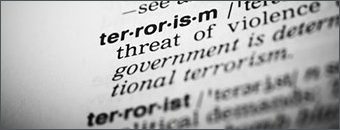
Counter-terrorism

The Council of Europe is dedicated to upholding human rights, the rule of law and pluralist democracy, and is determined to combat terrorism, which rejects these three fundamental values. Its work in this field begain in the 1970s, but efforts have been stepped up since 2001, following the unprecedented terrorist attacks in the United States.
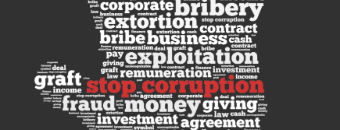
Action against economic crime and corruption

The Council of Europe's approach consists of three interrelated elements: supporting the implementation of the relevant standards (treaty law and soft law), assisting and facilitating the implementation of recommendations from monitoring mechanisms (GRECO and MONEYVAL) and providing capacity-building based on country-specific needs and assessments.
Evaluation of anti-money laundering measures and the financing of terrorism
MONEYVAL
The Committee of experts on the evaluation of anti-money laundering measures and the financing of terrorism (MONEYVAL) is a permanent monitoring body of the Council of Europe entrusted with the task of assessing compliance with the principal international standards to counter money laundering and the financing of terrorism and the effectiveness of their implementation, as well as with the task of making recommendations to national authorities in respect of necessary improvements to their systems.
Criminal asset recovery
The Conference of the Parties set up under the Council of Europe Convention on Laundering, Search, Seizure and Confiscation of the Proceeds from Crime and on the Financing of Terrorism (CETS No. 198) monitors the proper implementation of the Convention by the Parties and, at the request of a Party, expresses an opinion on any question concerning the interpretation and application of the Convention.
Fight against corruption
Group of States against Corruption (GRECO)
GRECO is the Council of Europe's anti-corruption monitoring body; its 49 members comprise 48 European States and the United States of America. Its objective is to improve member States' capacity to fight corruption by assessing their compliance with Council of Europe anti-corruption standards through a process of mutual evaluation and peer pressure. It helps to identify deficiencies in national anti-corruption legislation and policies, prompting the necessary legislative, institutional and practical reforms.
